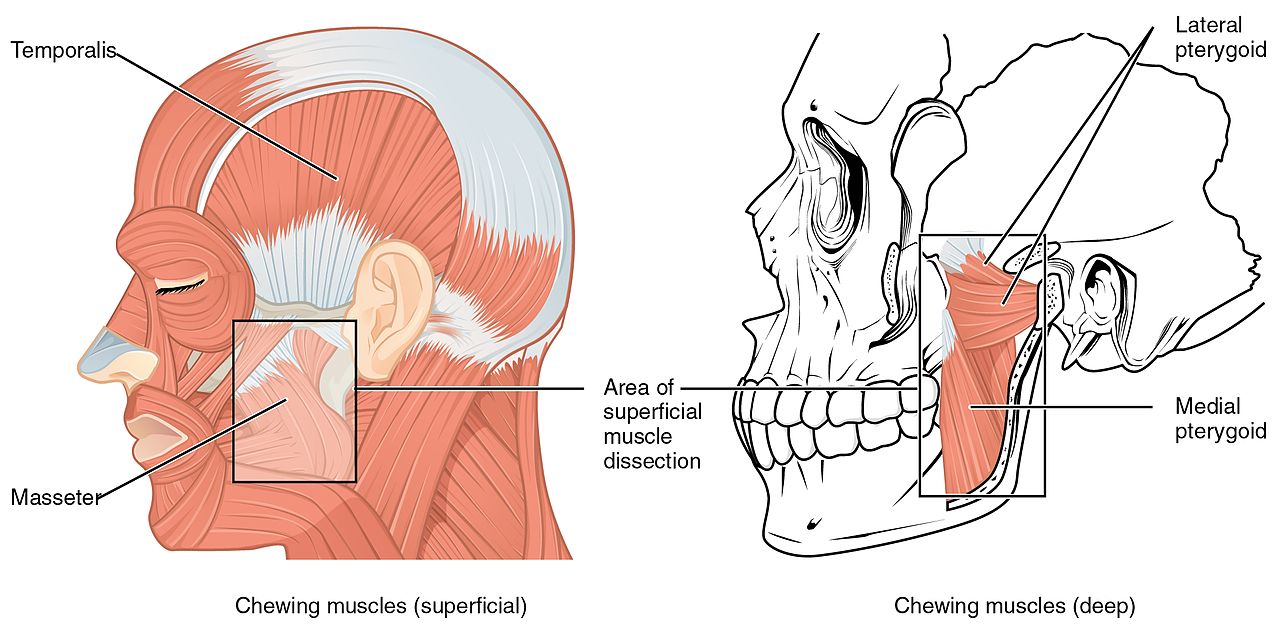
wikimedia.org
Jaw pain can be extremely uncomfortable and interfere with day-to-day activities like eating and speaking. So what is causing this discomfort specifically? Let’s examine the typical offenders and practical remedies for reducing jaw pain.
Understanding Jaw Anatomy
The mandible, or jaw in scientific parlance, is an essential part of our body that allows us to chew, speak, and even breathe. It is a complicated system made up of bones, muscles, ligaments, and joints that cooperate to support a variety of activities.
- Common Causes of Jaw Pain: There are many different causes of jaw discomfort, from lifestyle choices to dental problems. For management and treatment to be effective, it is important to comprehend these factors.
- Temporomandibular Joint Disorder: The disorder known as temporomandibular joint disorder (TMJ) affects the joints that attach the jaw to the skull. When moving the jaw, it may cause discomfort, stiffness, and clicking noises.
- Dental Issues and Jaw Pain: Jaw discomfort can be exacerbated by dental issues such as cavities, gum disease, or misplaced teeth. Discomfort in the jaw region may also be a result of gum disease or tooth infection.
- Stress and jaw-clenching: Physical symptoms of stress might include clenching of the jaw or grinding of the teeth, especially during the night. The jaw muscles may get strained as a result of these repeated actions, leading to discomfort.
- Poor Posture and Jaw Alignment: Sustaining proper posture is essential for general health, which includes proper jaw alignment. Unnecessary tension on the jaw muscles caused by poor posture might eventually cause discomfort.
- Grinding Your Teeth (Bruxism): Teeth grinding, or bruxism is a prevalent but sometimes disregarded source of jaw discomfort. Overuse of grinding can cause discomfort and stiffness by wearing down the enamel and straining the jaw muscles.
- Trauma and Jaw Injuries: Facial and mandibular injuries and accidents can result in severe pain and suffering. Muscle strains, dislocations, and fractures might happen and need to be treated right away.
- Sinus Problems and Jaw Discomfort: Because of their close closeness, sinus infections or inflammations can send discomfort to the jaw region. Jaw discomfort that already exists may get worse due to sinus pressure and congestion.
- Lifestyle Factors and Jaw Pain: Several lifestyle choices, such as biting one’s nails excessively, chewing too much gum, or using one’s teeth to pry open things, can put strain on the jaw muscles and cause pain.
- Seeking Professional Help: A trip to a healthcare provider is necessary if you have severe or persistent jaw discomfort. Specialists in TMJ issues, oral surgeons, or dentists can offer a correct diagnosis and suggest suitable courses of action.
Home Remedies for Jaw Pain
While awaiting professional evaluation, several home remedies can help alleviate mild to moderate jaw discomfort:
- Apply Heat or Cold: To ease painful muscles and minimize inflammation, apply a warm compress or cold pack.
- Practice Relaxation Techniques: Take up techniques like yoga, meditation, or deep breathing to release tension and stress in your jaw.
- Massage the Jaw Muscles: To ease tension and encourage relaxation, give your jaw and face a gentle massage.
- Avoid Hard or Chewy Foods: Eat only soft, easily digested meals to avoid aggravating your jaw muscles further.
- Use Over-the-counter Pain Relievers: Over-the-counter drugs such as acetaminophen or ibuprofen can provide momentary relief from pain and inflammation.
Prevention Tips for Jaw Pain
Preventing jaw pain involves adopting healthy habits and addressing underlying issues:
- Maintain Good Posture: To lessen the tension on the jaw and neck muscles, sit up straight and stand up straight.
- Limit Stress: Use stress-reduction strategies and steer clear of bad behaviors like grinding your teeth or clenching your jaw.
- Stay Hydrated: To keep the body and muscles hydrated and to support general health, drink lots of water.
- Practice Jaw Exercises: To increase flexibility and strengthen the muscles in your jaw, do some mild exercises.
- Attend Regular Dental Check-ups: Regular dental checkups can assist in spotting possible problems early on and treating them to prevent worsening.
Conclusion
Jaw pain can greatly interfere with day-to-day activities, but it can be relieved by knowing its origins and using practical treatment techniques. Proactive measures can reduce discomfort and enhance general well-being. These include treating oral concerns, controlling stress, and maintaining proper posture.
Author Bio: All In One Dental Innovations is a premier dental practice located in Dublin, California, offering comprehensive dental services to patients of all ages. As a trusted dentist in Dublin, CA, their team is dedicated to providing exceptional care with a personalized touch. With a focus on patient education and preventive dentistry, they strive to empower individuals to maintain optimal oral health for a lifetime. Combining state-of-the-art techniques and a commitment to ongoing innovation, “All In One Dental Innovations” is proud to serve the community by delivering top-notch dental care in a comfortable and welcoming environment.
